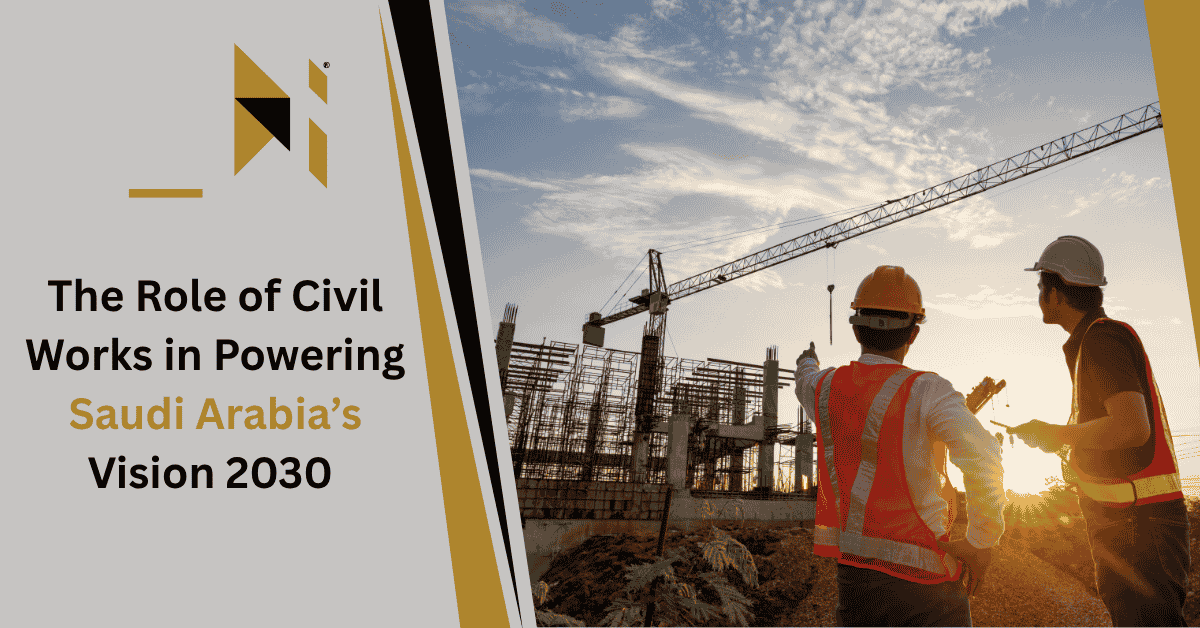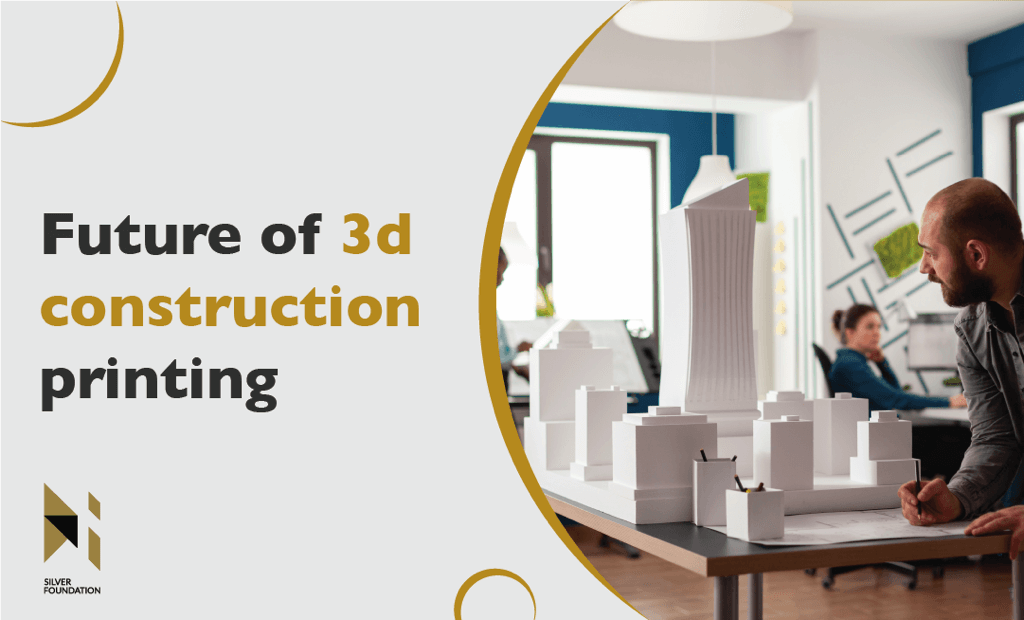Saudi Arabia’s Vision 2030 is a bold roadmap aiming to reshape the nation’s future. It focuses on diversifying the economy, modernising infrastructure, and empowering its people. Infrastructure and civil works play a vital role in this journey: roads, bridges, water systems, and public buildings form the foundations of growth. As the Silver Foundation understands well, building works are not just about construction; they are about creating the backbone that supports energy projects, urban expansion, and economic diversification. Throughout this transformation, structural works will be central to powering developments in energy, transport, cities, and sustainability. They are the essential force driving Vision 2030 into reality.
Vision 2030 of Saudi Arabia is a national change agenda that is designed to lessen the reliance on oil and establish a diversified and sustainable economy. At the heart of this vision is the modernization of the infrastructure which is the foundation of growth and investment.
The strategy will focus on strategic areas like tourism, renewable energy, logistics and manufacturing to create new sources of revenue and international competitiveness. The enabling environment of these ambitions is structural works- transport networks, utilities and urban development, which connect strategic programs with actual advances.
Different marquee projects demonstrate the use of infrastructure as a basis of economic diversification to draw foreign investors and innovations. These combined initiatives make Saudi Arabia one of the regional industry, cultural and technological centres, transforming its long-term developmental patterns.
Role of Civil Works in Powering Saudi Arabia
Civil works are essential in the operations of Saudi Arabia as they are the basis of developing the energy industry. They make energy projects run on time and of high quality, whether it is the construction of power plants and substations, the development of roads, drainage, or utility networks. They offer the required infrastructure which sustains both conventional and renewable energy.
The relationship between energy production and communities is facilitated through structural works to empower the vision of sustainable growth in Saudi Arabia. Such works contribute to making the kingdom more powerful, as they guarantee safety, durability, and efficiency. They highly contribute to the economic development of the country. Power in the region is much dependent on strong structural works.
Involvement of Civil Work in Different Sectors
Civil engineering is a very critical part of Saudi Arabian development and more so with the vision 2030 which focuses on increasing infrastructure, modernizing and diversifying the economy. There is more than just construction in structural work, as it goes to design, planning and sustainability in the long run. There are six significant areas of building work contribution as mentioned below:
Transportation and Infrastructure
- Expansion of highways, bridges, and tunnels.
- Development of smart traffic systems.
- Railways and metro connectivity projects.
The field of structural work in transportation is aimed at enhancing connectivity within the kingdom. Having large deserts and the increasing urban centres, engineers create highways and bridges that endure the weather under extreme conditions.
Riyadh, Jeddah and Makkah have rail and metro systems that enhance movements and reduce congestion. These projects support the Vision 2030 objectives as they incorporate a smart transport system to provide efficiency and safety.
Oil and Gas Industry
- Construction of refineries and pipelines.
- Development of offshore facilities.
- Storage tanks and industrial complexes.
The oil and gas industry of Saudi Arabia is mainly dependent on structural engineering. It involves laying thousands of kilometres of pipelines to construct offshore drilling platforms, among other things, which ensures efficiency in the operation.
Engineers come up with hardy facilities that can withstand the adverse environmental factors. Massive refineries and industrial areas such as Jubail and Yanbu indicate the importance of structural projects to the country to keep the energy backbone.
Healthcare Sector
- Construction of advanced hospitals.
- Specialized medical research centers.
- Emergency care and rehabilitation facilities.
Structural engineers come up with healthcare infrastructures according to the current medical requirements. Saudi Arabia is spending a lot of money on projects related to health and can afford mega-hospitals, specialized cancer and cardiac centers.
Such projects as the King Fahd Medical City are evidence of engineering excellence in the development of patient-friendly environments. These not only cater to the citizens but also draw medical tourism in line with national goals of accessing quality healthcare.
Education and Research Facilities
- Universities and technical institutes.
- Research laboratories and innovation hubs.
- Student housing and smart campuses.
The future development is based on the education infrastructure. Building work in Saudi Arabia contributes to the development of the modern campuses and laboratories of such world-class universities as KAUST and King Saud University. Smart facilities are combined with sustainable design in research hubs.
Another area of concern for engineers is the construction of environmentally friendly classrooms, libraries and hostels. These projects increase the international academic image of Saudi Arabia and contribute to the shift in the country to a knowledge-based economy.
Urban Development and Housing
- High-rise towers and residential complexes.
- Smart city planning initiatives.
- Public utilities and community spaces.
As urbanization takes place at a fast pace, the housing projects in Riyadh, Jeddah and Dammam are the core of engineers. They come up with eco-friendly residential complexes, high-rise buildings, and gated communities.
Civil futuristic works, such as NEOM and The Line, that incorporate AI and renewable energy can be seen through mega projects. The contribution of engineers to the quality of life of citizens is also reflected in the development of public utilities like water networks, sewage systems and parks.
Tourism and Entertainment Sector
- Development of cultural heritage sites.
- Theme parks and resorts.
- Mega projects for international tourism.
Building work helps Saudi Arabia move towards a non-oil-based economy to rely on tourism. Modernizing the heritage sites such as Diriyah, the engineers are building resorts of world standards along the Red Sea.
Some of the projects, like the Qiddiya Entertainment City, include theme parks, stadiums, and hotels. Such developments must be carefully planned to be able to integrate tradition and modernity to make Saudi Arabia a global tourism destination as part of Vision 2030.
Challenges in Civil Works Development
Various challenges have been encountered in the development of structural works in Saudi Arabia, and need smart solutions. The challenging desert climate requires materials and designs that can endure the extreme heat, sand and scarce water resources.
The fact that sustainability and the rapid development of the country are incompatible also complicates the situation. The lack of a skilled workforce is another urgent problem that will slow the process and quality.
Meanwhile, designers must balance the needs of modern infrastructure and cultural heritage very well so that new projects are both progressive and traditional. These challenges will be essential to overcome to create strong, sustainable, and vision-focused structural works which are in line with the long-term vision of the kingdom.
Outlook: Civil Work Development Beyond 2030
In the long term, the structural works will be in the limelight of developing the post-oil economy in Saudi Arabia. Civil engineering will change with the emergence of green hydrogen, smart cities, and more advanced digital infrastructure to enable cleaner energy and smarter living.
Projects shall be aimed at efficient, resilient and connected spaces that will improve the daily life of citizens as well as global trade and investment. Investing in future-oriented building works will support the Saudi Arabian economy at an emerging level. They also play a role in making the world sustainable. The future is one that can offer infrastructure that is innovative and long-term, rooted in the benefits of people and progress.
Conclusion
Summing up, the core of the Saudi Arabian Vision 2030 is the civil works, which leads to the development of infrastructure, energy and urbanization. They guarantee sustainable development, enhanced interconnectedness, and sustainable economic change. Silver Foundation has been playing an essential role in this endeavour, providing credible and practical projects. The successful and sustainable future of Saudi Arabia is indeed built upon the civil works, making the vision become a reality.
Frequently Asked Questions
What is the contribution of civil works to Vision 2030?
Civil works offer infrastructural support, such as energy, transport, water, and urban works, which is essential in attaining the Vision 2030 objectives.
What are the structural works projects of Saudi Vision 2030?
Some of the most critical projects are NEOM, the Line, Riyadh Metro, Red Sea Project and renewable energy plants.
What are the contributions of building works to the economy of Saudi Arabia?
They generate employment, invite investments, enhance industries and promote diversification other than oil.
What are the challenges facing civil works in Saudi Arabia?
The challenges are the adaptation of the climate, sustainability, labor demand, and the reconciliation of the rapid urbanization and heritage.




